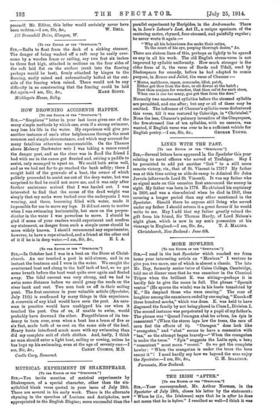METRICAL EXPERIMENT IN SHAKESPEARE.
[To THE EDITOR OF THE "SPECTATOR."] SIR,—You invite mention of metrical experiments by Shakespeare, of a special character, other than the six- syllabled blank verse quoted in your issue of July 18th. There are several in his early work. There is the alternate rhyming in the speeches of Luciana. and Antipholns, now appropriated to the English Elegiac; more successful than the parallel experiment by Euripides, in the .Andromache. There is, in Love's Labour's Lost, Act II., a unique specimen of the
cantering metre, rhymed, four-stressed, and painfully regular ; he never wrote it again :—
"Why all his behaviours doe make their retire, To the court of his eye, peeping thorough desire," &c.
There are sixteen lines of this, perhaps as lightly to be spared as any in all his work. The old English stress-verse is not improved by syllabic uniformity. How much stronger is the older form of it, the verse of Borde and Udall, used by
Shakespeare for comedy, before he had adapted to comio purpose, in .Romeo and Juliet, the verse of Chaucer :— " Morne, malthorse, capon, coacombe, idiot, patch, Either get thee from the dore, or sit downe at the hatch: Dost thou conjure for wenches, that thou cal'st for such store, When one is one too many, goe get thee from the dore."
Normally two unstressed syllables before the stressed syllable are permitted, and one after; but any or all of these may be omitted. The influence of Chaucer's syllabic verse disfeatured this verse, till it was restored by Coleridge, in " Christabel." None the lees, Chaucer's palmary invention of the Cinquepace, the five-stressed line of ten syllables, with no caesura, was wanted, if English verse was ever to be a sufficient vehicle for English poetry. —I am, Sir, &c., GEORGE YOUNG.






































 Previous page
Previous page